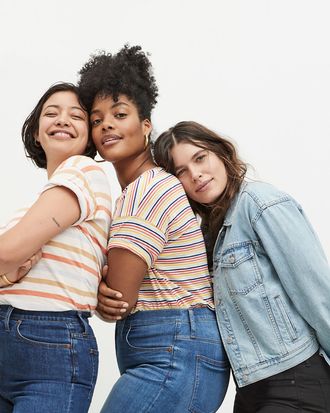
One of the problems with trying to shop ethically is that you’re mostly relying on what each company is telling you. There’s no real governing body that sets regulations, in the way that food has the FDA or the USDA organic certification. There are subsets — like a group that certifies that cotton is organic, and watchdog groups like the Clean Clothes Campaign. But when it comes to giving a gold star on the production, there’s really only one option, and that’s Fair Trade.
Fair Trade — which is an organization, not just an adjective — is known for setting production ground rules for coffee and chocolate, but you’re probably going to hear about it a lot more in the mainstream fashion world, too. For one thing, the group has partnered with J.Crew and Madewell as both brands attempt to become more sustainable — both in terms of environmental friendliness and ethical production.
Right now, there’s not much consumers know about J.Crew’s production. Their site says they have a code of conduct for each of their factory partners, but doesn’t give any additional information about how that’s enforced or who their factory partners are, or even where they are. The Good on You app, a site that gauges how sustainable a brand is, gives them a rating of ⅖ or “not good enough” (Madewell, which is part of the J.Crew Group, is not rated separately). But all that may change sooner rather than later.
Madewell sees itself as a denim company, first and foremost. So that’s where it is focusing its first effort. The collection, out now, consists of 16 denim pieces that are certified Fair Trade. The company’s plan is to “look at the best-selling styles and what we invest the most in and align our fair trade rollout plan with that volume,” per Madewell president Libby Wadle. It’s a smart move because jeans are a famously unsustainable piece of clothing.
How this all works: Madewell and J.Crew Group will help key factories go through the Fair Trade Certification process, which takes about six months to a year. To be certified, the factory has to meet a set of rigorous criteria in terms of environmental policies and wages for workers. J.Crew Group will agree to pay a premium for any goods coming out of the factory, and a democratically elected group of workers in the factory will decide where that extra money goes. It could be a bonus for every worker, a day-care center, a school, or anything else they want based on the needs for that factory. At Fair Trade factories, maternity leave, paid leave, and pay parity between men and women are guaranteed.
This isn’t the company’s first foray into the ethical sphere, but it is the one with the most significant impact on the people who make its clothes. Madewell has spent a lot of time thinking about the end life of its jeans — through initiatives that turn recycled jeans into housing insulation for Habitat for Humanity and capsules that use eco-friendly materials like organic cotton — but now it’s looking at the beginning as well, and, more importantly, the workers.
The first factory J.Crew Group is helping to get Fair Trade certified is Saitex. It’s the Chanel of denim factories, famous for its quality. The Vietnamese factory has also worked with Everlane and GSTAR on eco-friendly denim. “They were already well on their way. They’re just clean clean clean,” Wadel said.
Of course, Saitex is only one out of the factories in 26 countries that J.Crew Group uses. But ideally, it’ll be the first of many. Each certification takes about a year — a lot of time. But Wadle is hopeful that this is the start to a more sustainable Madewell. “I knew Fair Trade meant something good, but I think now that I really understand that it touches people in a way. This is a way to enrich and enhance people’s lives who are touching our product.”
It’s worth pointing out that while many brands in recent years have touted new eco-friendly capsules, this is the only one I can think of from a mainstream brand that focuses on the worker’s rights. “The end game is for the workers, but to participate [in Fair Trade Certification], you have to be an environmentally friendly factory doing the right things,” Wadle said. “It affects everyone, so we want everyone to jump on board. The hope is that more people will be involved with Fair Trade.” It’s impossible to declare a definitive win-win situation in the fashion industry, but this is getting closer to being good for everyone involved, as well as the planet.




